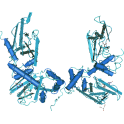
- Remove this product from my favorite's list.
- Add this product to my list of favorites.
Products
Viewed products
Newsletter
 |  |  |  |  |  |

Background: cAMP-dependent protein kinase (PKA) is an ubiquitous serine/theonine protein kinase present in a variety of tissues. The intracellular cAMP level regulates cellular responses by altering the interaction between the catatytic C and regulatory R subunits of PKA. The inactive PKA holoenzyme is activated when cAMP binds to the regulatory subunits which induces the release of two active catalytic subunits.
Cyclic AMP-dependent protein kinase type II beta is the predominant PKA isoform and principal mediator of cAMP action in the central nervous system. The majority of PKA type II is targeted to specific sites in the cytoskeleton or organelles of neurons via high-affinity binding to so called A Kinase Anchoring Proteins (AKAPs). AKAPs place PKA type II in proximity with neurotransmitter-activated adenylate cyclase, neurotransmitter receptors for desensitization, ion channels and substrates in the cytoskeleton such as microtubule-associated proteins. The recombinant RII beta regulatory subunit supplied by Biaffin is a 90 kDa dimeric protein (monomer 45 kD) suitable for inhibition studies and analysis of AKAP interactions.
Theoretical MW: 90 kDa (dimeric protein)
Expression system: E. coli
Storage buffer: 20mM MES pH7, 150mM NaCl, 2mM EDTA, 2mM EGTA, 1mM ß-ME, 20% Glycerin
Purity: >60% (SDS-PAGE)
Protein concentration: 1.96 mg/ml (Bradford method using BSA as standard protein)
Inhibitory Activity: The cAMP-Dependent Protein Kinase, regulatory subunit RIIï¢ reversibly inhibits the catalytic subunit Cα of the cAMP-dependent protein kinase PKA. The inhibition of the catalytic subunit can be reversed by the addition of the second messenger cAMP (> 1µM).
Entrez Gene ID: 5577
UniProtKB: P31323
Ordering informations: shipped on dry ice
Glantz SB, Amat JA, Rubin CS (1992) "cAMP signaling in neurons: patterns of neuronal expression and intracellular localization for a novel protein, AKAP 150, that anchors the regulatory subunit of cAMP-dependent protein kinase II beta" Mol. Biol. Cell. 3 (11):1215-28
Hirsch AH, Glantz SB, Li Y, You Y, Rubin CS (1992) "Cloning and expression of an intron-less gene for AKAP 75, an anchor protein for the regulatory subunit of cAMP-dependent protein kinase II beta" J. Biol. Chem. 267(4):2131-4
Licameli V, Mattiace LA, Erlichman J, Davies P, Dickson D, Shafit-Zagardo B (1992) "Regional localization of the regulatory subunit (RII beta) of the type II cAMP-dependent protein kinase in human brain" Brain Res. 578(1-2):61-8
Rios RM, Celati C, Lohmann SM, Bornens M, Keryer G (1992) "Identification of a high affinity binding protein for the regulatory subunit RII beta of cAMP-dependent protein kinase in Golgi enriched membranes of human lymphoblasts" EMBO J. 11 (5):1723-31
SB Glantz, Y Li and CS Rubin (1993) "Characterization of distinct tethering and intracellular targeting domains in AKAP75, a protein that links cAMP-dependent protein kinase II beta to the cytoskeleton" J. Biol. Chem., 268 (17): 12796-12804
Keryer G, Luo Z, Cavadore JC, Erlichman J, Bornens M (1993) "Phosphorylation of the regulatory subunit of type II beta cAMP-dependent protein kinase by cyclin B/p34cdc2 kinase impairs its binding to microtubule-associated protein 2" Proc. Natl. Acad. Sci U S A.90(12):5418-22.
Li Y, Rubin CS (1995) "Mutagenesis of the regulatory subunit (RII beta) of cAMP-dependent protein kinase II beta reveals hydrophobic amino acids that are essential for RII beta dimerization and/or anchoring RII beta to the cytoskeleton." J. Biol. Chem. 270(4):1935-44.
Nesterova M, Yokozaki H, McDuffie E, Cho-Chung YS (1996) "Overexpression of RII beta regulatory subunit of protein kinase A in human colon carcinoma cell induces growth arrest and phenotypic changes that are abolished by site-directed mutation of RII beta" Eur. J. Biochem. 235(3):486-94
Brandon EP, Logue SF, Adams MR, Qi M, Sullivan SP, Matsumoto AM, Dorsa DM, Wehner JM, McKnight GS, Idzerda RL (1998) "Defective motor behavior and neural gene expression in RIIbeta-protein kinase A mutant mice" J. Neurosci. 18(10):3639-49
Sardanelli AM1, Signorile A, Nuzzi R, Rasmo DD, Technikova-Dobrova Z, Drahota Z, Occhiello A, Pica A, Papa S. (2006) "Occurrence of A-kinase anchor protein and associated cAMP-dependent protein kinase in the inner compartment of mammalian mitochondria."FEBS Lett. 580(24):5690-6.
Collado-Hilly M1, Coquil JF.(2009) "Ins(1,4,5)P3 receptor type 1 associates with AKAP9 (AKAP450 variant) and protein kinase A type IIbeta in the Golgi apparatus in cerebellar granule cells." Biol Cell. 101(8):469-80.
Recombinant human cAMP-dependent protein kinase: PKA, RI alpha, 25 µg - 385,00 €
Recombinant human cAMP-dependent protein kinase: PKA, holo type I alpha, 25 µg - 385,00 €
Recombinant cAMP-dependent protein kinase: PKA, holo type II alpha, 25 µg - 385,00 €
8-Br-cAMP, 100 µmol - 66,00 €
cAMP, 500 µmol (~176 mg) - 70,00 €
8-Cl-cAMP, 10 µmol (~4 mg) - 127,00 €
8-CPT-cAMP, 100 µmol - 109,00 €
DB-cAMP, 100 µmol - 59,00 €
PKI, 100 µg - 125,00 €
Follow us